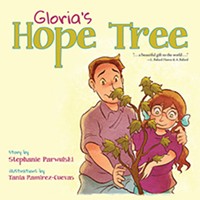The Frozen Chosen
And a new world on high
In 1940, President Franklin Roosevelt proposed that persecuted European Jews be given a temporary safe haven in Alaska. Congress turned down that proposal, but what if the idea had lingered, and was acted on a few years later? That's one question at the heart of Michael Chabon's new novel The Yiddish Policemen's Union. Chabon expands this historical "what if," serving up a whole world, foreboding but oddly familiar, in a story that mixes political speculation with questions of exile, identity and love, wrapped in the casing of a 1940s hard-boiled detective novel, complete with snappy dialogue and dead wiseguys.
Chabon won the Pulitzer Prize for The Amazing Adventures of Kavalier & Clay, another historical "what if" which conflated the birth of American comic books and the fight against Nazism. According to the premise of Yiddish Policemen's Union, after World War II's end, the infant state of Israel collapsed in 1948, and the people moved to "Aleyeska," turning the town of Sitka into a Yiddish (not Hebrew) metropolis of two-million-plus people -- the "frozen chosen." Sixty years later, however, the United States is reclaiming the land and Sitka's Jews are agonizing over the "Reversion."
Out of that background emerges detective Meyer Landsman, besieged by life on all sides. His ex-wife is his new supervisor; his partner, the half-Tlingit Berko Shemets, is marginally competent; and now a fellow resident of a fleabag hotel has been murdered. The victim turns out to be a heroin-addicted chess whiz and the fallen son of Sitka's most powerful rabbi who, rumor has it, is connected to the Orthodox black-hat-and-sidelocks gangs that rule parts of the city. For some reason, no one wants the murder case solved, and Landsman is determined to find out why not.
As he did in Kavalier & Clay, Chabon ignites a Big Bang of imagination, creating a continually surprising and precisely painted alternate world filled with apocalyptic overtones and goofy humor. One big difference here, though, is Chabon's use of detective novels' snappy tough-guy dialogue and concise descriptions. What that means, essentially, is shorter sentences. And for Michael Chabon, that's a big deal. Usually a master of run-on sentences bulging with wildly imaginative, visually vivid descriptions and conversations, Chabon here has to say more with less. Most of the time, he pulls it off, while at others the cuteness of the 1940s homage wears thin.
Another problem, which Chabon manages less successfully, is the unwieldy convergence of all the various story elements in the last part of the book -- not an uncommon problem in genre-bending novels, though Chabon is still more in control than some of his equally imaginative contemporaries like David Foster Wallace or Matthew Sharpe. Considering how many strands he's pulling together, it's amazing that Yiddish Policemen's Union actually works about 80 percent of the time.
In any case, Chabon is a writer's writer, a craftsman who delights in dialogue, is adept at creating atmosphere thick enough to feel, and brings cultural insights to bear on the characters' struggles. Even today when we've gotten used to postmoderns fiddling with forms, this fun-house mirror version of a noir novel is a cross-genre classic.
Richard Preston, whose previous best-sellers, The Hot Zone and The Demon in the Freezer, were gripping true-life medical thrillers, offers a change of pace in this look at the people who climb and explore the world's tallest trees -- the 350+-feet tall redwoods of northern California.
There's botanist Steve Sillett, a volatile soul who developed techniques for safe ways to climb to the upper reaches of "the blue whales of the plant kingdom"; Michael Taylor, an incurable obsessive who has discovered more tall redwoods than every other person on earth put together; and Marie Antoine, a fellow scientist who married Sillett. Once these explorers attained the upper reaches of the redwoods' canopies, they discovered what Preston calls "coral reefs in the air." The giant trees, it turns out, are hosts to a slew of other life forms including fern gardens, huckleberry bushes and rhododendrons that grow out of the accumulated soil on the redwoods' branches, as well as a variety of lichens, birds and bugs that are seen almost nowhere else. The canopies themselves -- at the tops of trees that are often over 2,000 years old -- are frequently divided into "caves" made of foliage, creating a maze-like environment most humans have never dreamed of.
Preston's skillful interweaving of the climbers' individual stories and their astonishing discoveries make for a mesmerizing read that explains the complexities of the largest living things on earth.
The Yiddish Policemen's Union
by Michael ChabonHarperCollins, 432 pages, $26.95
The Wild Trees
by Richard Preston(Random House, 320 pages, $25.95
Latest in Books
Calendar
-

WHISKEY TASTING: VIRGINIA HIGHLANDS WHISKY @ Elizabeth Parlour Room
-

NEW WINDOW GALLERY-Pat Rhea-ACRYLIC PAINTINGS-April 05-30 2024 VALDESE, NC 28690 @ New Window Gallery/Play It Again Records
- Through April 30, 12 p.m.
-
An Evening With Phil Rosenthal Of "Somebody Feed Phil" @ Knight Theater
-
Kountry Wayne: The King Of Hearts Tour @ Ovens Auditorium
-

Trap & Paint + Karaoke @ Zodiac Bar & Grill
-
Susan Brenner Examines Upheaval While Celebrating Trees
Chaos and beauty
-
Jessica Moss Makes the Gantt Center a Safe Zone for Local Artists 2
Flipping the script
-
Breaking the Moon musical brings light to dark side 12
A Teenie Galaxy












